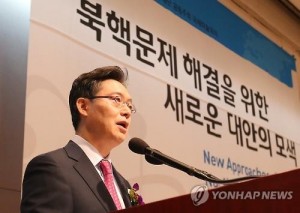- California Assembly OKs highest minimum wage in nation
- S. Korea unveils first graphic cigarette warnings
- US joins with South Korea, Japan in bid to deter North Korea
- LPGA golfer Chun In-gee finally back in action
- S. Korea won’t be top seed in final World Cup qualification round
- US men’s soccer misses 2nd straight Olympics
- US back on track in qualifying with 4-0 win over Guatemala
- High-intensity workout injuries spawn cottage industry
- CDC expands range of Zika mosquitoes into parts of Northeast
- Who knew? ‘The Walking Dead’ is helping families connect
S. Korea seeks direct nuclear talks with N. Korea

South Korea’s top nuclear envoy Hwang Joon-kook deliver a speech at a Seoul forum on the North Korean nuclear issue on Aug. 28. (Yonhap)
SEOUL (Yonhap) — Emboldened by rare successful one-on-one talks with North Korea on ending a military crisis, South Korea hopes for fresh momentum in efforts to denuclearize the communist neighbor.
“We expect the nuclear issue to be discussed directly between South and North Korea in the near future,” Seoul’s top nuclear envoy Hwang Joon-kook said Friday at a forum to commemorate a landmark nuclear deal a decade ago, known as the Sept. 19 Joint Statement.
The North has long maintained that its nuclear program is a bilateral issue with the United States as it is aimed at countering Washington’s “hostile” policy on Pyongyang.
The North apparently used the six-party talks as a tool to negotiate with the U.S., not the four other member states–South Korea, China, Russia, and Japan.
Pyongyang claims to have become a nuclear power, calling for mutual disarmament with Washington.
Hwang made clear that South Korea is also a key party concerned when it comes to the nuclear issue.
He stressed the need to redouble efforts to resume the six-party talks as the two Koreas have shifted to a dialogue mood.
With the Beijing-based negotiations stalled since 2008, the secretive North has continued to develop its nuclear capability.
On the other hand, its diplomatic isolation has deepened.
China does not blindly support the North any more over its provocative acts that undermine regional stability, Hwang pointed out.
Coordination among the other five parties is stronger than ever, he added.
“There seems to be no other realistic alternative other than consistently pursuing pressure and dialogue based on unity among the countries concerned,” the envoy said.
Experts said the U.S. should be more active in addressing the matter, instead of sticking to “strategic patience.”
“The United States needs to show its impressive attention to North Korea,” Kim Sung-han, former vice foreign minister of South Korea, told the forum. It was co-hosted by the Institute for National Security Strategy in Seoul and the U.S. think tank Heritage Foundation.
He proposed the U.S., China, and the two Koreas hold separate “peace talks” as soon as possible in parallel with the six-party negotiations.
They can discuss how to replace the armistice agreement with a peace treaty to put a legal end to the 1950-53 Korean War, he said.
Bruce Klingner, senior researcher at Heritage Foundation called for a mixture of “conditional engagement” with the North and punitive measures against it for any provocation.
“Regrettably, the world has not become largely inured to North Korea’s development of nuclear weapons, repeated violations of Security Council resolutions and international law, and belligerent threats,” he said.












![일본 사도광산 [서경덕 교수 제공. 재판매 및 DB 금지]](http://www.koreatimesus.com/wp-content/uploads/2024/07/PYH2024072610800050400_P4-copy-120x134.jpg)


